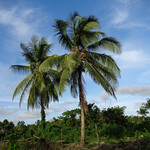
Mahogany and teak products are the economic backbone of Central Java’s Jepara district and have earned worldwide recognition for their quality and sustainability. They also provide livelihoods to thousands of small-scale enterprises in Indonesia’s flagship furniture industry. Yet the timber-dependent artisans who run them face increasing global competition and suffer from inefficient production processes, low levels of organization and limited access to finance.
International buyers are crucial to the prosperity and future competitiveness of Jepara’s centuries-old furniture industry, which contributed $187 million to Indonesia’s export revenue in 2019. At the same time, both the volume and value of the country’s furniture shipments abroad have been in decline since the global financial crisis in 2008, while Jepara has experienced a surge in investment from other sectors, such as textiles, due to the district’s lower minimum wage rate.
Small-scale furniture enterprises in Jepara have therefore lost much of their labor force to industries that offer higher pay and better conditions, including insurance coverage. Workers in the local furniture sector – particularly women – are paid below this rate, with no extra benefits. In addition, larger competitors have gained a tighter grip on export markets, which increasingly demand minimum production capacity and standards-based processes that workshops with only one or two people cannot provide. As a result, the number of furniture producers in Jepara dropped from 12,000 in 2011 to about 6,000 in 2018, according to census figures.
To help address this imbalance, the Center for International Forestry Research (CIFOR) implemented a five-year project aimed at improving the efficiency of mahogany and teak furniture producers in Jepara while enhancing their livelihoods. With funding from the Australian Centre for International Agricultural Research (ACIAR) and the collaboration of Indonesian government bodies at both national and local levels, the initiative led to the establishment of the Jepara Small-Scale Furniture Producers Association (APKJ) in 2008 a 10-year roadmap that resulted in a district regulation for the development of the furniture industry.
“APKJ is becoming an example of how small-scale producers can organize themselves,” says Ahmad Dermawan, a CIFOR researcher who studied the project’s impact. “Members have better access to markets through their participation in trade shows and exhibitions. They also have more networking possibilities and a stronger voice on social and political issues in Jepara.”
Members have boosted their incomes through training programs on production techniques and online marketing, while gaining legal accreditation that small businesses would otherwise be unable to afford. They also gain the opportunity to obtain certification under Indonesia’s timber legality assurance system, known as SVLK, which is required for access to international markets, such as the European Union and Australia. Such accreditation provides the buyer with a guarantee that timber used in a particular product has not been sourced from illegal logging.
The SVLK system – which was introduced in 2009 – has been lauded as a model for others to follow, including China, Ghana, Malaysia and Vietnam — countries that are considering similar schemes of their own to access markets requiring the SVLK stamp of approval. In 2016, Indonesia became the first country in the world to gain EU recognition for its timber legality system. The United States, where the Lacey Act — a statute banning illegally sourced timber products — is strictly enforced, is now the destination point for more than 40 percent of Indonesia’s wooden furniture exports.
However, the wider community of Jepara’s small-scale furniture producers has yet to embrace efforts to organize the industry. The APKJ has only managed to increase its membership from 60 to 130 since its establishment in 2008. The association also lacks the financial resources to expand its activities because it does not charge any fees.
“The low number of additional new members in 10 years shows that engaging small-scale producers as a group is not an easy task,” Dermawan says. “From the questionnaires we sent to furniture makers, it became clear that many nonmembers of APKJ were simply unaware of the association’s existence. More needs to be done to boost awareness and to raise funds for the benefit of its members.”
Jepara’s District Regulation 2 of 2014 – known as Peraturan Daerah – has also had a limited impact in its purview to “protect, empower and foster” the local furniture industry. A timber terminal has yet to be found for storage and trans-shipment purposes, while an SVLK clinic to help producers reach export certification standards relies on the central government’s budget.
In addition, the district regulation still has no technical guidelines in six key areas: furniture export quality standards; insurance coverage; the registration and updating of data on furniture producers; education and training; the creation of an industry council; and the establishment of a financing unit for furniture producers. Changes in government personnel also hamper implementation of the district regulation, which is little known to many officials.
“The magnitude of the district regulation’s impact will depend on completion of the technical guidelines,” Dermawan says. “The local government will need to change its priorities, allocate funding, and secure an agreement with the local parliament.”
The prosperity and livelihoods of Jepara’s small-scale furniture businesses can be enhanced significantly through effective organization and regulation.
With improved awareness and cooperation, Indonesia’s furniture hub will further strengthen its long-standing reputation as a model for the world to follow, Dermawan says.
We want you to share Forests News content, which is licensed under Creative Commons Attribution-NonCommercial-ShareAlike 4.0 International (CC BY-NC-SA 4.0). This means you are free to redistribute our material for non-commercial purposes. All we ask is that you give Forests News appropriate credit and link to the original Forests News content, indicate if changes were made, and distribute your contributions under the same Creative Commons license. You must notify Forests News if you repost, reprint or reuse our materials by contacting forestsnews@cifor-icraf.org.












